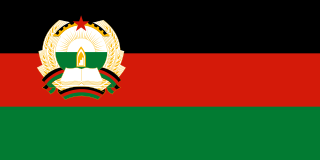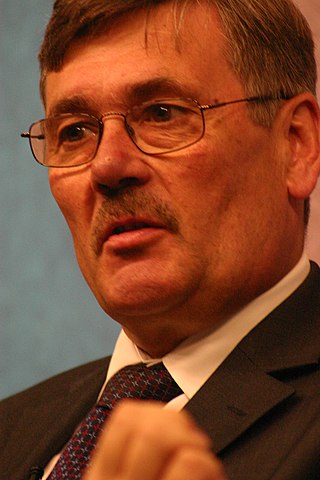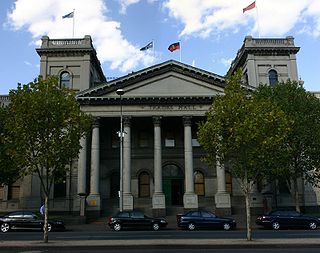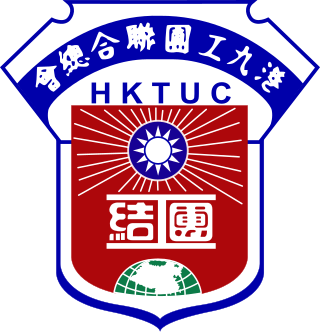Related Research Articles

The Democratic Republic of Afghanistan (DRA), renamed the Republic of Afghanistan in 1987, was the Afghan state during the one-party rule of the People's Democratic Party of Afghanistan (PDPA) from 1978 to 1992. It relied heavily on assistance from the Soviet Union for most of its existence, especially during the Soviet–Afghan War.
A national trade union center is a federation or confederation of trade unions in a country. Nearly every country in the world has a national trade union center, and many have more than one. In some regions, such as the Nordic countries, different centers exist on a sectoral basis, for example, for blue collar workers and professionals.

Robert William Ainsworth is a British Labour Party politician who was the Member of Parliament (MP) for Coventry North East from 1992 to 2015, and was the Secretary of State for Defence from 2009 to 2010. Following the general election in 2010 he was the Shadow Defence Secretary, but was replaced by Jim Murphy following the election of Labour leader Ed Miliband.

The Hong Kong Federation of Trade Unions (HKFTU) is a pro-Beijing labour and political group established in 1948 in Hong Kong. It is the oldest and largest labour group in Hong Kong with over 420,000 members in 253 affiliates and associated trade unions. Presided by Ng Chau-pei and chaired by Kingsley Wong, it currently holds four seats in the Legislative Council and five seats in the District Councils.

All India Central Council of Trade Unions (AICCTU) is a central trade union federation in India. It is politically attached to Communist Party of India (Marxist–Leninist) Liberation. According to provisional statistics from the Ministry of Labour, AICCTU had a membership of 639,962 in 2002.
The Tamil Nadu Democratic Construction Labour Union is a trade union of construction workers in the state of Tamil Nadu, India. TNDCLU is affiliated with the All India Central Council of Trade Unions. TNDCLU hopes to increase its membership to 15,000 during 2005.

A trades hall is a building where trade unions meet together, or work from cooperatively, as a local representative organisation, known as a labour council or trades hall council. The term is commonly used in England, New Zealand, Scotland and Australia. They are sometimes called a union hall, or labour temple in North America
A labour council, trades council or industrial council is an association of labour unions or union branches in a given area. Most commonly, they represent unions in a given geographical area, whether at the district, city, region, or provincial or state level. They may also be based on a particular industry rather than geographical area, as for example, in the Maritime Council of Australia which co-ordinated the waterfront and maritime unions involved in the 1890 Australian Maritime Dispute.
The National Workers' Union of Afghanistan (NUWA) was the sole labour body of Afghanistan, from 1990 until the Mujahideen rose to power in 1992. Previous to 1990 the Central Council of Afghan Trade Unions (CCATU) fulfilled the same role.

The Hong Kong and Kowloon Trades Union Council is the third largest trade union federation in Hong Kong, after the Federation of Trade Unions (FTU) and pro-Beijing Federation of Hong Kong and Kowloon Labour Unions (FLU). It is affiliated with the International Trade Union Confederation.
The New Zealand Council of Trade Unions is a national trade union centre in New Zealand. The NZCTU represents 360,000 workers, and is the largest democratic organisation in New Zealand.
Robert Kenneth Litherland, known as Bob Litherland, was a British Labour politician.
Trade unions in South Africa has a history dating back to the 1880s. From the beginning unions could be viewed as a reflection of the racial disunity of the country, with the earliest unions being predominantly for white workers. Through the turbulent years of 1948–1991 trade unions played an important part in developing political and economic resistance, and eventually were one of the driving forces in realising the transition to an inclusive democratic government.
Trade unions in Afghanistan have a brief and turbulent history, beginning in 1967 and effectively ending with the Islamic state of the Mujahideen. There has been no reported trade union activity since the military intervention and removal of the Taliban regime.
The South Asian Regional Trade Union Council (SARTUC) is a federation of national trade union centers whose geographic scope covers South Asia. SARTUC's mission is to promote workers' rights within its member nations.

The Trades Union Congress (TUC) is a national trade union centre, a federation of trade unions in England and Wales, representing the majority of trade unions. There are 48 affiliated unions, with a total of about 5.5 million members. Frances O'Grady became General Secretary in 2013 and presented her resignation in 2022, with Paul Nowak becoming the next General Secretary in January 2023.

The Federation of Hong Kong and Kowloon Labour Unions (HKFLU), established in 1984, is the second largest trade union in Hong Kong, after the Hong Kong Federation of Trade Unions, having 82 trade unions and more than 60,000 members in total. The federation was established in 1984.
The South African Industrial Federation (SAIF) was established in 1914 as an amalgamation of the Industrial Federations in the provinces of South Africa.
The South African Trades Union Congress (TUC) was a national trade union federation in South Africa.
Die Spoorbond was an Afrikaner railway trade-union formed in 1934 by H. J. Klopper, founder of the Afrikaner Broederbond, which advocated a policy of replacing all black railway-workers with Afrikaners. It rejected strikes and called instead for loyal service to the South African Railways and Harbours Administration (SARHA). The union had a membership of some 16,000 in the 1930s, considerably more than that of its rival, the National Union of Railway and Harbour Servants, which was forced to dissolve in 1937.
References
- ICTUR; et al., eds. (2005). Trade Unions of the World 6th Ed. John Harper Publishing. ISBN 0-9543811-5-7.